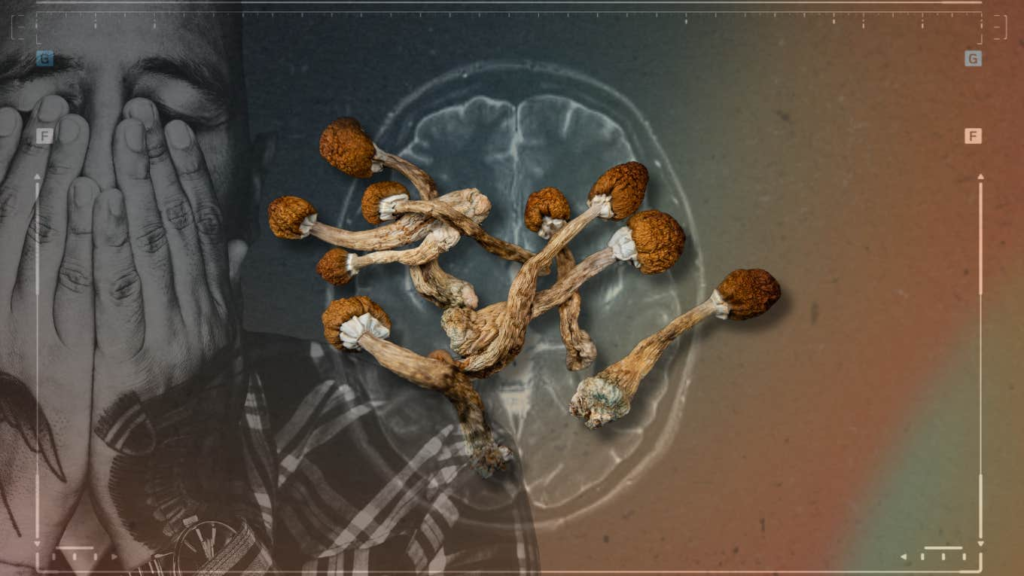My Husband Microdoses Magic Mushrooms Because Doctors Have No Answers For His Health Problems

On September 29, 2020, my husband tested positive for COVID-19, and he’s not been the same since. Thrust into the world of invisible and chronic illness, he’s one of millions now facing the challenges of living with Long COVID.
Honestly, I’m wondering if that diagnosis even matters anymore. The diagnosis of long-term COVID implied he would recover and return to his pre-covid self — that all the health challenges he was experiencing were temporary and, like the unseen magic of new growth that works under the soil in the dark, one day he would wake up and be normal again.
I’m starting to see that none of us were ever “normal,” and the COVID-19 infection merely exploited the weaknesses already inherent in our bodies. My husband was always on the borderline of exhaustion and lived with chronic depression. He was functional and successful in his career with proper rest and medication.
When COVID hit him, it slammed him to the bed and announced, No more getting by, my friend. Every weakness you’ve ever had is about to be exacerbated tenfold. Unable to return to work, my husband has had to face his demons. Pills that once allowed him to pretend all was well do little more than keep him from total despair.
For three years, doctors, including “experts” that make up a group in a Long COVID clinic that we uprooted our lives to attend, have done little more than eliminate what isn’t plaguing him, confirm some vitamin deficiencies and prescribe more meds and higher doses. They’ve ascribed the brain fog, memory loss, fatigue, insomnia, and body pain to worsening depression from COVID-19. Perhaps they’re right, perhaps they don’t know. The only clear thing is that they aren’t equipped to help him.
Last year, my niece and her husband invited us to their lake house so my husband could experience a trip on mushrooms. They were adamant that psilocybin mushrooms were the answer to his mental and cognitive woes. Desperate to feel better, my husband was willing, open, and ready to take the plunge.
On the other hand, I live life much more conservatively and cautiously. There was a lot to consider:
- Reactions with current antidepressants?
- Could the experience cause worsening depression or anxiety?
- What if he got worse in general?
- How could we trust what he was taking?
- Could the trip do irreversible damage?
Unsure of how psilocybin would impact him, we declined their offer but began research into the world of mushrooms. We learned some fascinating things. The Netflix documentary, Fantastic Fungi, is worth watching. I aim to keep an open mind and challenge long-held stereotypical impressions about what I’ve learned or felt certain about. Letting go of certainty has been a foundational step in my recent journey.
In a quick minute, I learned that clinical studies and trials with psilocybin were showing promising and life-altering results for those with chronic depression, anxiety, addiction, and PTSD, and even helping terminal cancer patients live with a better quality of life. Macrodosing with psilocybin — or in slang terms — “tripping” has been shown to alter brain chemistry so dramatically that patients who were once hopelessly burdened with PTSD, addiction, or debilitating depression have been able to maintain positive results after one to three “trips”.
Why aren’t more people flocking to psilocybin clinics for professional help? Because it’s only legal in Oregon, Denver, and some parts of California. And because, you guessed it, insurance doesn’t cover treatment (yet), making the cost prohibitive for most. Harken back to the days before marijuana was legal, and many were desperate for the help it gave for pain and nausea relief. It may be many years before psilocybin is readily available for those it could dramatically help.
No longer willing to be a guinea pig in this post-COVID world, my husband has decided that a naturally grown substance can’t hurt more than all the chemicals doctors prescribe, so we looked into microdosing.
Microdosing entails ingesting small amounts of psilocybin mushrooms a few days a week. The dosage is so small that there is no experience or trip, but the theory is that over time, the psilocybin supports change in the brain, allowing the patient to move beyond depressive or harmful thought patterns.
It’s not an overnight fix, but — and this may be wishful thinking — I’m seeing significant changes in my husband. Casual observers probably don’t notice anything, but I’ve been keenly attuned to even subtle changes in his demeanor or behavior since his initial infection with COVID-19.
Here are 5 things I’m noticing and find promising since he started microdosing magic mushrooms:
1. He talks more.
He’s never been a huge talker, but he’s barely used words since COVID. Sometimes only answering my questions with nods or grunts. Conversing has been exhausting for him and depression only makes this worse. Since micro-dosing, he’s talking more to me and others.
2. He uses more vocabulary when he talks.
Aside from just basic conversation, he’s starting to elaborate, adding colorful vocabulary to his dialogue. For example, the other day, he was talking to the dogs, telling them that “beggars can’t be choosers.” Again, I’m sure that sounds like no big deal but trust me, it is! The other night he even used the word “salacious” in a conversation!
3. He’s able to finish sentences now.
One of the things Long Haulers experience with their cognitive challenges is talking in complete sentences, being able to finish thoughts, or finding the right words to express what they want to say. These limitations add to their unwillingness to talk. They feel stupid or self-conscious about their stumbling about trying to find words. I’ve noticed my husband speaks better and feels confident about talking and finishing sentences. He still can’t remember what cauliflower is and calls it cabbage, but I’m hopeful about his progress!
4. He engages in social activities.
He has never been a super social person; however, he is a lot of fun when he feels good. The depression and brain fog worsened and triggered by Long COVID have kept him from interacting with others and socializing. Now he’s attending community meetings, making new friends at the dog park, and participating in card bingo night in our community!
5. He takes things in stride.
Anxiety was greatly exacerbated by the COVID-19 infection, causing him to get stressed over small things or obsess over things that would have never bothered him before. After micro-dosing for a few weeks, he asked me, “Do you notice I am less anxious?” I had noticed that he stopped the stimming, or self-soothing practices, like twirling his hair.
It’s too soon to tell if micro-dosing is the answer to all his long-term COVID symptoms; we are adding new protocols as we are made aware of them and are currently working with someone in functional medicine. But, if these improvements continue with micro-dosing, we see no harm in continuing to explore the world of fantastic fungi.
Mary Gallagher teaches women how to declutter to make room for what matters. She’s been published in The Joyful Life Magazine, A Cup of Comfort series, Writer on Fire: Poetry Prompts to Ignite the Poet Within, and is a frequent contributor to various Medium publications as well as her own, The Decluttered Soul.
This article was originally published at Medium. Reprinted with permission from the author.






